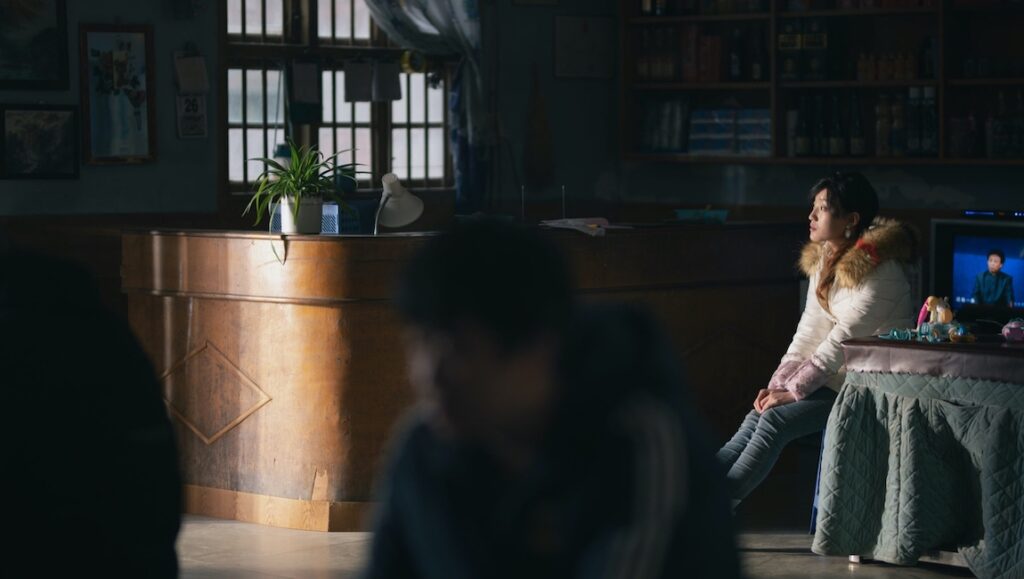What’s more hip than mimicking the particular, diffuse, long-take formalism favored by many of the most acclaimed filmmakers in Asia today? How about having your characters (all film students, filmmakers, and hangers-on name-checking Hou Hsiao-hsien and, foolishly given the specific context, Hong Sang-soo) come off like pretentious hacks, thereby signifying self-awareness and even self-deprecation embedded in what has been billed as a loosely autobiographical film? Such seemed to be the stratagem that new generation Chinese director Wei Shujun utilized for his first feature debut, last year’s Striding Into the Wind — and so for all its insight into the soul-deadening, glad-handing, hierarchical rigidity of Chinese independent filmmaking, it became hard to shake off the feeling that Wei’s slack pacing and reliance on compositionally generic master shots weren’t merely an earnest bit of posturing, especially as this aesthetic tends to sap the dynamism out of some of his more sharply written scenes.
All that changes with Ripples of Life: Wei’s second two hour-plus feature in as many years shares a lot of the industry-centric subject matter as his first, but it also more decisively differentiates its own ambitions from those of the director’s (still apparent) influences. The result impresses both as a vital piece of social commentary and a formidably executed feat of high-concept filmmaking. One strong example of Wei’s improvement is found in the clever construction of the film’s narrative, which sheds the slacker ethos that guided Striding Into the Wind together with its wayward Wei surrogate, shifting its focus among three main characters instead, each confined to distinct and largely non-overlapping storylines as they come to grips with their own respective ‘roles’ on the set of a film — itself titled Ripples of Life — over the course of a few days on location in a small town, just prior to the start of production.
The first narrative follows Xiao Gu (Huang Miyi, a deadringer for a young Zhou Xun, by the way), a restaurateur and native resident of the town in which the film-within-a-film is set to shoot whose diligent catering to the crew gradually earns her a place in front of the cameras — an opportunity far outside the boundaries of her simple homelife. The second story revolves around this meta-Ripples of Life’s lead actress, Chen Chen (Yang Zishan), arriving by escort from the city but actually a native of the town; she left to pursue her career and, now that she’s returned, seeks to reconnect with old friends, only to find that those relationships are now mired in the kinds of expectations that are generated by her newfound fame. Finally, for the most rewarding section of Wei’s film, we hunker down with the film-within-a-film’s director (Liu Yang) and its screenwriter (Kang Chunlei, who is also the actual screenwriter of Wei’s film) for an extended verbal sparring match that encompasses filmmaking ethics and the struggle for artistic integrity, as well as both the self-serving pretensions and commercial compromises that can frequently serve as pitfalls of independent filmmaking.
This concluding section of Ripples of Life is not only the best stretch of the film; it also serves to reframe the previous two parts and expands the scope of what Wei is going for here: not just a meta-commentary on, or acerbic satire of, the Chinese filmmaking industry, but a more stinging addressing of the realities of social (im)mobility, with the partitioning of ‘roles’ on a film as analogue for particular disparities of class. That might seem a little too on the nose, but its last few sequences push things further, acknowledging the ultimate insignificance of its own micro-focuses as it deliberately broadens out beyond the scope of its film-centric narrative, referencing a specific real-life event that, indeed, extends even beyond the borders of China itself. A final montage returns us to each of the main characters, glimpsed in their more intimate moments outside the film production’s narrative, all leading up to the first day of filming. The crew smiles for a group photograph, and Wei cuts to black — a final suggestion that the importance of film lies less in experiencing the work itself than feeling its reverberations, the opportunities it provides to reflect on the meaning in our own lives.
Originally published as part of Cannes Film Festival 2021 — Dispatch 8.
Published as part of NYAFF 2022 — Dispatch 2.


Comments are closed.